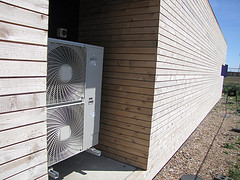Heat Pumps Provide Cheaper Heating *and* Cooling
 The name "heat pump" is misleading. This appliance actually does an efficient job of both heating and cooling your home. Unlike conventional HVAC systems, a heat pump functions by moving heat, rather than generating hot or cold air. This heat may be sourced from the air (the most common type, also known as "air-to-air"), water, or earth (geothermal). In winter, your heat pump will transfer warm air into your home, while in the summer, it will move warm air out. Whether used alone or in conjunction with your existing HVAC system, a heat pump will reduce your energy consumption and save you money on utility bills.
The name "heat pump" is misleading. This appliance actually does an efficient job of both heating and cooling your home. Unlike conventional HVAC systems, a heat pump functions by moving heat, rather than generating hot or cold air. This heat may be sourced from the air (the most common type, also known as "air-to-air"), water, or earth (geothermal). In winter, your heat pump will transfer warm air into your home, while in the summer, it will move warm air out. Whether used alone or in conjunction with your existing HVAC system, a heat pump will reduce your energy consumption and save you money on utility bills.
Why a Heat Pump is Greener -- and Cheaper
Because a heat pump does not need to use any energy to actually warm or cool the ambient air, it is more energy-efficient than conventional HVAC methods. Generally, a heat pump can generate 3-5 kilowatts of heat for every unit of energy it consumes. In addition, it is not powered by fossil fuels but rather by electricity. Electricity has the advantage of being a renewable resource, and is extra environmentally friendly when obtained from the sun, as with photovoltaic solar panels. What is more, you don't have to worry about off-gassing of carbon monoxide in your home, as you would with any type of fuel burning system.
Where to Use
Heat pumps are ideal for homes in locations with relatively moderate climates. In areas like Minnesota which experience very cold winters, generally a heat pump should be supplemented with a conventional furnace or other heat source. For summer, the cooling mode of your heat pump should be combined with dehumidification to afford maximum comfort, especially if you live in a state with high humidity, such as Florida.
Which Heat Pump is Right for You
You can choose a heat pump to install in your house from a variety of sizes. The right one for your family will depend on a number of factors, including the size of your home, the number and square footage of windows, and the amount of insulation. The size you choose will in turn determine the heat pump installation cost, which is also affected by the quality of the unit and what, if any, work will be required to retrofit. Consider also the model's winter heating season performance factor (HSPF) -- the amount of space heating needed, divided by the pump's electricity use -- and summer seasonal energy efficiency ratio (SEER) -- the amount of heat removed from the home, once again divided by electricity usage.
How to Save Money
Federal tax credits are being offered on the purchase and installation of a geothermal heat pump, on a step-down basis through December 31, 2021. Although the documentation does not need to be submitted with your income tax return, keep your receipts for parts and labor, together with the manufacturer's signed certification statement, attesting that your purchase is eligible for the tax credit. Additional incentives may be available on new installation or upgrade of an old heat pump. Check with your HVAC contractor.
How to Get the Most from Your Heat Pump
Before you install your heat pump, take the opportunity to make sure that your ductwork is well sealed and insulated, to minimize potential heat loss. You can take care of routine maintenance yourself: protect the unit from snow, change the filters once a month, and clean the outdoor coils and fan as necessary. In addition, schedule an annual professional inspection and repair any heat pump problems promptly.
Laura Firszt writes for networx.com.
Updated March 22, 2018.
Looking for a Pro? Call us (866) 441-6648

Heating & cooling Average Costs
HVAC Contractors Experiences

Urgent Air Conditioner Repair At Pizzeria Caught In A Heatwave

New HVAC Installation After My Furnace Failed Inspection



